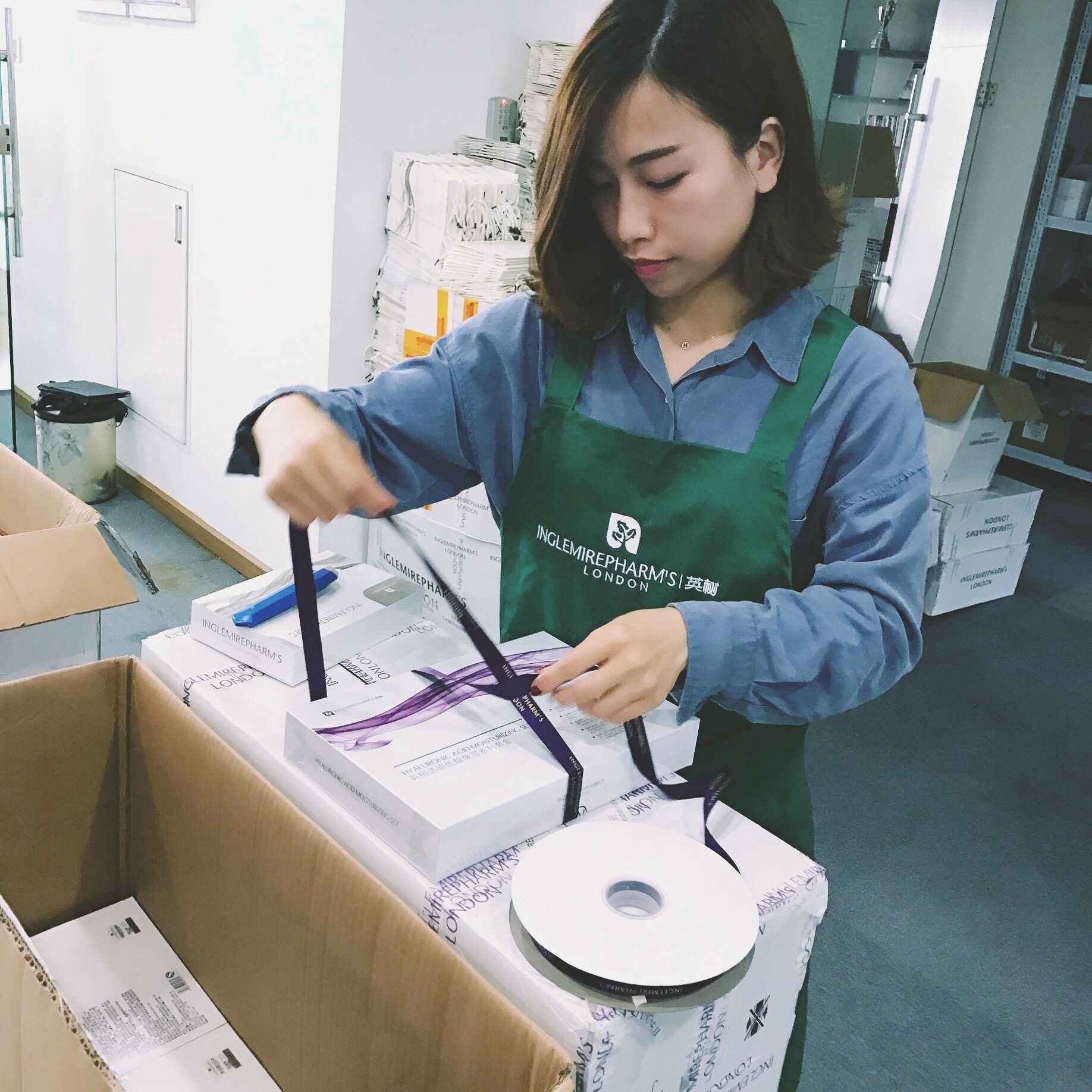
One third of WeChat users spend four hours a day in the app. Photo credit: Pedro Serapio.
WeChat, China’s most dominant social messaging app, is notorious for its all-consuming nature: payments, food, transportation, entertainment, and of course, social networking. There are in-app services that rent bikes, sell movie tickets, live stream – and even locate nearby bathrooms for you.
But underneath these services, the app also hosts an unofficial market called weishang or ‘micro-shops.’ Run through personal WeChat accounts, micro-shops are unregulated sales channels that sell anything from fake Louis Vuitton bags to homemade cakes – to even guns.
“Buying, shipping, taking photos, customer service – I do it all,” Wang Meng, a micro-shop owner in Australia, tells Tech in Asia. “I respond on WeChat everyday – I don’t have a set time. If I’m not posting on my [newsfeed], I’m on vacation.”
“I want to have control over my own work day,” she adds.
Micro-shops sell anything from fake Louis Vuitton bags to relationship advice.
It works like this: Wang takes photos of different products – children’s toys, vitamins, bracelets – and posts them on her Moments, the app’s newsfeed-like feature. Interested customers message her directly or leave a comment. Payment can happen inside the app, which has its own payment system called WeChat Wallet, or other channels such as Alipay, another popular digital wallet in China.
Micro-shops aren’t restricted to any category of product, but Wang’s specialty is imported goods from Australia. She left Beijing and moved to Melbourne about two-and-a-half years ago, joining China’s far-flung diaspora. Now, she’s a stay-at-home mom with two kids, so the flexibility of a micro-shop suits her well. At her peak, she made more than US$4,000 a month.
“Micro-shops can definitely be a full-time job,” she says. “A lot of my friends who run around filling customer orders […] everyday make about US$10,000 a month.”

Wang carefully packs items for customer orders. After about twenty days, clients receive their goods in the mail. Photo credit: Wang Meng.
No strangers
In China, it’s not uncommon to hear about people who make a living – or even become rich – through social media: live streaming hosts, online comedians, even cartoonists. In the West, there are YouTube stars that rake in millions of dollars. In India, some entrepreneurs are using WhatsApp and Facebook – not Amazon or other ecommerce platforms – to sell goods.
But WeChat is unique. Not only does it come with built-in infrastructure for payments, blogging, and social networking – lending itself to entrepreneurial endeavors of all kinds – but it’s also an incredibly closed network. It’s designed to buffer you from strangers.
WeChat is designed to buffer you from strangers.
Unlike Facebook, there’s no friend recommendation feature in WeChat. You can’t see who your contacts are friends with, nor can you view comments or likes from users you’re not connected to – even if they’re just one degree away. If you want to add someone’s contact, you have to know their ID, scan their QR code, or be in the same chat group.
Other methods of adding strangers to your WeChat are sketchier or less targeted, such as approaching people in the street or using the app’s location-based “People Nearby” feature – which only applies to others who have it turned on.
“WeChat is a very closed space,” explains Qingqing, a micro-shop owner based in Ningbo, eastern China. “It’s not like Weibo [China’s Twitter equivalent] or Baidu.” In WeChat, you can see what your friends are up to, you can ‘like’ their Moments, you can chat with them, she says. “It’s the same with clients.”
“On Weibo and [ecommerce site] Taobao, it’s all strangers,” she says.

Qingqing, a stay-at-home mom and micro-shop owner, wraps up skincare products for clients. Photo credit: Msn Team.
That intimacy comes into play when Qingqing sells her skincare products. Through WeChat, she chats with clients about their skin condition and what kind of result they’re looking for. She then recommends suitable products and follows up with customers weeks after their purchase for feedback.
“When someone adds your WeChat, both people feel closer,” agrees Bai Erpang, a 30-year-old sex toy micro-shop owner in Shenzhen. “When you’re on [Taobao’s chat client], you’re probably just interested in buying or asking about a product.”
Bai uses Taobao, Alibaba’s ecommerce platform, to sell adult products, most of which are geared towards women or couples. But her interactions with clients on her WeChat are starkly different. Due to the lack of education around sex in China, a large portion of Bai’s work isn’t just sales but consultation. Chatting about personal matters is more comfortable over a platform like WeChat.
“Tell me your age, whether you’re married, whether you have kids, what kind of troubles you have during sex, and what areas you want to improve,” she says, emphasizing how detailed her conversations with clients can be. “Then I’ll give them tips or recommend products according to what they want.”

Product orders for Wang’s customers. Photo credit: Wang Meng.
Sandwiched between photos of products, Bai’s newsfeed also shows moments from her personal life, like selfies, memes that made her laugh, and other photos from her life. It’s the definition of not having a work-life balance – unlike some micro-shop owners, Bai doesn’t have a dedicated account for it – but she says that it makes clients trust her. Her ‘storefront’ embodies her personality.
“I really think the adult toys industry needs an authentic voice,” she says. That’s why when she reviews toys on her WeChat, she doesn’t shy away from pointing out the flaws or specifying who it’s suitable for – there’s no one-size-pleases-all. That makes her micro-shop unique, she says, differentiating it from other accounts that spam their contacts with ads – something micro-shops have developed a bad reputation for.
Gray market
Of course, WeChat’s closed system has its disadvantages. It’s difficult to achieve viral growth when you rely on word-of-mouth marketing. It takes time to accumulate more ‘friends’ and customers, even if your micro-shop has its own team. Bai and Qingqing, for instance, have dedicated employees who help manage their micro-shop, as well as other sales channels.
It also makes the app an ideal platform for illicit and gray market goods, like counterfeit products. As a brand, it’s difficult to find and track down micro-shop owners because you have to be personally connected with them in order to see their newsfeed. You can’t scrape the platform for data – and even if you could, the majority of your data would be images, not text.
“WeChat is very hidden,” James Luo, managing partner at Lawjay Partners, a law firm specializing in intellectual property litigation, tells Tech in Asia. “It’s very difficult to discover [infringements]. You have to find it peer-to-peer.”
To be a counterfeiter and get away with it, you just need to stick to the rules.
“If you’re an intellectual property lawyer and you want to fight a case […] you have to add them as a friend,” he says. Otherwise, you won’t be able to get the evidence you need, he says. Likewise, if you manage to add the right person, you can discover all kinds of products, even firearms and ammunition. But if not, their world is invisible to you.
It’s also hard to show how much money micro-shop owners make from their transactions – and conversely, how much damage they’ve inflicted on a brand. If purchases are made through WeChat, it’s impossible to link it to a sale. It simply looks like any other payment transfer, like two friends splitting a bill, or a tenant paying their landlord.
“Trying to catch perpetrators through WeChat alone is not doable,” Luo emphasizes. Instead, his firm will use it as a lead, possibly traceable to other contacts, like a WeChat brand account, a Taobao shop, or a brick-and-mortar store.
“To be a counterfeiter and get away with it, you just need to stick to the rules. You would never do anything outside of WeChat, for example,” says Dean Arnold, co-founder and director of The Intellectual Property Group, which investigates IP infringements for brands. “You would never arrange any meetings, even if people say they’re going to buy a thousand bags from you – don’t get greedy.”
Tencent does have its own flagging system for WeChat, where users can mark posts that they find questionable. But in cases of IP infringement, Luo says the tech giant is particularly slow – unlike politically sensitive posts, which are immediately shut down. Accounts that use third-party software to automate article posting or spam other users are also occasionally purged by WeChat.
Tencent could not be reached in time for comment.

Before starting her own adult toys micro-shop and Taobao shop, Bai Erpang busked and hawked goods on a street in Shenzhen. Photo credit: Bai Erpang.
It’s unclear how many micro-shops exist on WeChat. Like Bai’s account, the line between someone’s personal life and their micro-shop can be blurry. Sometimes micro-shop owners go on vacation or shut down their business, and their Moments revert back to what WeChat designed it to be – a personal newsfeed.
This post These hustlers make a living off WeChat’s thriving underground ecommerce appeared first on Tech in Asia.
from Tech in Asia https://www.techinasia.com/weishang-wechat-micro-shop
via IFTTT
No comments:
Post a Comment